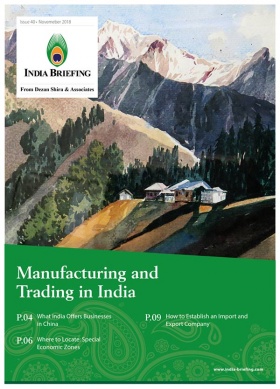Waste Management Opportunities in India’s Smart Cities
Editor’s Note: This is the final article in a three part series. The first can be found here and the second can be found here.
India’s rapidly urbanizing landscape necessitates effective and innovative waste management solutions. Aware of this need, the current government is funding planned urbanization schemes that will make Indian cities both easier to live in and more business friendly.
The central government first announced their ambitious ‘Smart Cities Mission’ in 2014, and the government has now earmarked roughly US$15 billion for the creation of 100 ‘smart cities’ as well as the rejuvenation of another 500 urban centers.
The success of these ‘smart cities’ will be, in part, dependent on the development of proper waste management systems. Furthermore, in order to renew poor infrastructure, the federal government is relaxing access to urban infrastructure and services sectors for private investment.
In the final part of this three part series, we look at the opportunities in partnering and investing in India’s waste management sector in the context of smart cities and planned urban growth.
What makes a smart city?
The Indian government has not provided a prescriptive definition of a smart city. Instead, the Smart Cities Mission outlines core elements necessary for smart urban planning that range from access to water, electricity, and affordable housing to urban mobility, good governance, and sustainable waste management.
Thus far, the Indian government has announced 60 of the 100 towns and cities to be included in the Smart Cities Mission – including Pune, Jaipur, and Lucknow. The remaining 40 cities are to be announced by June, 2017.
To make each city ‘smart’ will cost anywhere from US$1.55 billion to US$4.67 billion. The federal government will provide US$77.67 million per city over the span of four years: US$31 million will be allocated in the first year and US$15.5 million for the subsequent three years. State governments are expected to match the federal government’s funding of US$31 million for each of their respective cities.
The remaining investment is to be raised by the urban local body (ULB) responsible for specific smart cities. Funding is being sought through foreign direct investment as well as from the domestic private sector. Foreign trade missions from across the world have visited smart cities set to receive funding. The Modi government is also hoping to maintain the financial and logistical momentum for smart cities through public private partnerships (PPP).
Proper waste management will ‘smarten up’ Indian cities
ULBs are looking to technological innovation to curb rising garbage problems in newly minted smart cities. Agra – which houses the Taj Mahal – plans to install 293,000 garbage containers tagged with radio frequency identification (RFID). These waste containers will be tracked throughout the city to ensure they are used to their maximum efficiency. Additionally, 1,600 city sweepers will be given GPS tracking devices so as to coordinate on a city wide level.
Retrofitting new technologies into existing waste management structures, while using other technologies to redevise waste mapping systems, will allow for transparent and sustainable waste management.
Indian startups producing innovative technologies to help deal with India’s unique urban challenges have been teaming up with larger companies in order to bid on funding allocated for the Smart Cities Mission. The Indian government requires companies bidding on these projects to have years of experience and high turnover rates, a requirement that discounts virtually all startups. Established companies will benefit from partnering with tech-driven startups and usher in a veritable renaissance of effective waste solutions in a newly urbanizing landscape.
No trash talk as opportunities abound
India’s waste problems are not going to disappear quickly or quietly. The sheer amount of garbage of all kinds produced in the country easily outweighs the weak, and at times, nonexistent infrastructure meant to process it. However, the fact that small and medium businesses (SMEs) and startups are already invested in India’s waste management sector act as guides on how to both sustainably innovate and make a profit.
Moreover, the Indian government’s aspiration for a healthy and planned urbanization offers companies the chance to establish themselves as players in the rapidly growing sector.
Foreign companies looking to become a part of India’s waste management industry can profit by finding the right ULBs to work with while partnering with Indian enterprises specialized in addressing the country’s unique waste management issues.
About Us
India Briefing is produced by Dezan Shira & Associates. The firm assists foreign investors throughout Asia and maintains offices in China, Hong Kong, Indonesia, Singapore, Vietnam, and Russia.
Please contact india@dezshira.com or visit our website at www.dezshira.com.
- Previous Article SMEs and Startups in India’s Waste Sector
- Next Article Company Setup in India – Establishing Offices and Partnerships









